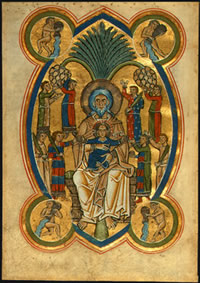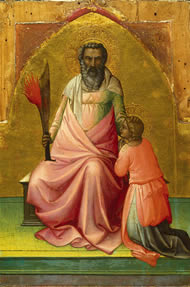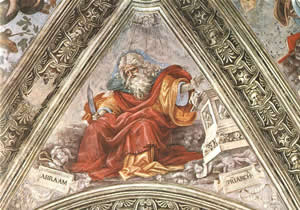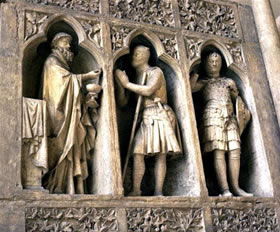The Longest and Hardest Journey
Second Sunday in Lent
For Sunday March 20, 2011
Lectionary Readings (Revised Common Lectionary, Year A)
Genesis 12:1–4a
Psalm 121
Romans 4:1–5, 13–17
John 3:1–17 or Matthew 17:1–9
About 4,000 years ago a family of nomads left Ur of the Chaldeans, perhaps in southeastern Iraq near Nasariyah, and settled in Haran, Turkey, on the Syrian border. In Haran the family patriarch died, while his son Abraham started hearing voices. In time, Abraham believed that those voices constituted a call from God, and so he dared to obey those voices.
"Leave your country," God told Abraham. "Leave your people and your family. Leave all that you hold dear and familiar. Go to the land I will show you."
"So Abraham left, as the Lord had told him." He couldn't have known it at the time, but in leaving Haran Abraham altered human history forever.
 |
Paradise with Christ in the Lap of Abraham, c. 1239. |
He set out in faith, not knowing where he was going, or even why he was going, except that God had commanded him. He defied both the inner propensities of human nature and the outer pressures of cultural conformity that lure us in the opposite direction. Most of us want to journey from the unknown to the known, from what we do not have to what we think we want and need, from the strange and the unpredictable to the safe and the secure, and from mere promises to human guarantees. Whereas Abraham acted whole-heartedly but without certainty, we demand certainty and act timidly.
God's call upon Abraham's life is a call that's repeated to each one of us today. It's a call that subverts conventional wisdom, and so it feels counter-intuitive. God calls us to move beyond three very human, powerful and deep-seated fears — fear of the unknown that we can't control (ignorance), fear of others who are different from us (inclusion), and fear of powerlessness in the face of impossibilities (impotence).
Abraham's departure from Haran was more than a mere change of geography. In leaving Haran for Canaan, Abraham left all that was familiar — all custom and comfort, family and friends, all the regularity and rhythm of his life. The only thing he would retain of Haran was the power of memory. He journeyed from present clarity into a future of profound ignorance. Abraham journeyed from what he had to what he did not have, from the known to the unknown, from everything that was familiar to all things strange.
 |
Abraham, by Lorenzo Monaco, c. 1408-1410. |
Thus the New Testament commentary on his subversive obedience to God: "By faith Abraham, when called to go to a place he would later receive as his inheritance, obeyed and went, even though he did not know where he was going. By faith he made his home in the promised land like a stranger in a foreign country" (Hebrews 11:8–9).
With his journey into the unknown, Abraham embraced ignorance, relinquished control, and chose to live with confidence in God's promise to bless him in a new and strange place. But that required a second choice on his part. He had to leave not only his geographic place. He had to leave behind his narrow-minded, small-minded, parochial vision, the tendency in all of us to exclude the strange and the stranger. God gave a staggering promise to this obscure, Semitic nomad: in response to his obedience, God would make Abraham the benefactor of all the world.
There's a simultaneous narrowing and expansion of God's action in history, a movement from the particular to the universal. God calls a single individual, Abraham, and promises him that he will inherit all the earth. There's a progressive expansion in God's promise. God vows to make of him a "great nation." Paul describes him as a father of "many nations" (Romans 4:17 = Genesis 17:5). We then read that "all peoples on earth will be blessed through" Abraham (12:3). Once again, the New Testament commentary elucidates this Old Testament story. Through this one man, and the one nation Israel, God made Abraham "the father of us all" (Romans 4:16–17). In one particular person God enacted his universal embrace of all humanity.
 |
Abraham by Fillipino Lippi, 1502, Fresco, Strozzi Chapel, Florence. |
In Romans 3:29 Paul asked a provocative question: is God the God of Jews only? Or is he not also the God of Gentiles? In contrast to every attempt to claim God as ours, and ours alone, Paul says that in Abraham God loves all people equally. In the famous words of this week's gospel, God so loves all the world (John 3:16).
Our tendency is to fear the other, to marginalize the strange, to dismiss all that is different from who and what we know. In his book Christ Plays In Ten Thousand Places (2005), Eugene Peterson comments on our sectarian, narcissistic narrow-mindedness. We
exclude all who don't suit our preferences. We become a sect. Sects are composed of men and women who reinforce their basic selfism by banding together with others who are pursuing similar brands of selfism, liking the same foods, believing in the same idols, playing the same games, despising the same outsiders...A sect is accomplished by community reduction, getting rid of what does not please us, getting rid of what offends us, whether of ideas or of people. We construct religious clubs instead of entering resurrection communities...[But] with the call of Abraham, the long, slow, complex, and still continuing movement to pull all these selves into a people of God community began. The birthing of Jesus' community on the Day of Pentecost was an implicit but emphatic repudiation and then reversal of Babel sectarianism.
Instead of exclusionary parochialism, instead of defining people out of the community "according to our own tastes and predispositions" (Peterson), God calls us to a universal and inclusive embrace of everyone and "all peoples on earth."
There was one problem to God's promise of progeny to bless the entire world through a single individual who in obedience had journeyed into the unknown. Abraham and his wife Sarah were both about seventy-five years old (Genesis 12:4), and while they might not have enjoyed our knowledge of human biology, they knew that they were far beyond their child-bearing years. Humanly-speaking, they faced an impossibility that brought them face to face with their own powerlessness to alter their circumstances. As for bearing a child, barren Sarah and impotent Abraham were "as good as dead" (Hebrews 11:12).
But Abraham made a counter-intuitive and subversive choice; he believed that God had the power to perform what he had promised. He believed that he's a God who "gives life to the dead and calls things that are not as though they were" (Romans 4:17, 21). That is to say, Abraham moved beyond his fear of powerlessness to faith that God could, quite literally, make something out of nothing. After a few false starts, Issac, the son of promise, was born.
When God called Abraham, he subverted conventional wisdom and moved beyond normal and understandable human fears — ignorance, inclusion, and impotence. Instead of lamenting his ignorance and the loss of control, he embarked upon a journey into the unknown. Instead of fearing inclusion of the strange and the outsider, he bore God's promise of universal blessings for the whole earth. In the face of his own impotence, he believed that God could do the impossible. In so doing, Abraham became "the father of us all."
 |
Abraham and Melchizedek, Reims Cathedral, c. 1250. |
The longest and hardest journey is not the exterior journey without but the interior journey within. The geography of ancient Canaan pales in comparison to the complex geography of the human heart. Saint Augustine once cautioned Christians: "Whoever thinks that in this mortal life a person may so disperse the mists of bodily and carnal imaginings as to possess the unclouded light of changeless truth, and to cleave to it with the unswerving constancy of a spirit wholly estranged from the common ways of life — such a person understands neither what he seeks, nor who he is who seeks it" (The Spirit of Early Christian Thought, p. 286).
Lent, then, is not merely about giving up chocolate, meat, or alcohol. Those are only external reminders of an internal transformation that we seek. Our ultimate journey is to move from a self-regarding heart curved in on itself to an other-regarding openness to the love of God, a love for others, and a love for all His world. That journey lasts a lifetime.
For further reflection:
* Compare and contrast the journey without and the journey within.
* Which of Abraham's three "movements" speaks most to you: ignorance, inclusion, or impotence?
* Reflect on the truth that God "gives life to the dead and calls things that are not as though they were" (Romans 4:17, 21).
* Meditate: "By faith Abraham, when called to go to a place he would later receive as his inheritance, obeyed and went, even though he did not know where he was going. By faith he made his home in the promised land like a stranger in a foreign country" (Hebrews 11:8–9).
Image credits: (1) National Gallery of Art; (2) Metropolitan Museum; (3) Web Gallery of Art; (4) Bryn Mawr College.





